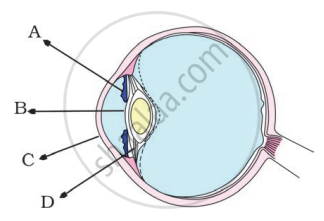Advertisements
Advertisements
प्रश्न
The image of an object at an infinite distance is obtained in a real and erect form through a convex magnifying glass.
पर्याय
Right
Wrong
उत्तर
The image of an object at an infinite distance is obtained in a real and erect form through a convex magnifying glass- Wrong
APPEARS IN
संबंधित प्रश्न
A person got his eyes tested by an optician. The prescription for the spectacle lenses to be made reads :
Left eye : +2.50 D
Right eye : +2.00 D
State whether these spectacle lenses will converge light rays or diverge light rays.
Name two parts of the eye which refract light rays (or bend light rays).
Name the part of the eye:
which controls the amount of light entering the eye.
Name the part of the retina which is insensitive to light.
Fill in the following blank with suitable word:
To bring light from a distant object to a focus on the retina of the eye, the convex eye-lens needs to be made..........
There are two types of light-sensitive cells in the human eye:
Where are they found?
If you walk from a dark room into sunlight and back again into dark room, how would your pupils alter in size? What makes this happen?
A person got his eyes tested. The optician's prescription for the spectacles reads:
Left eye: − 3.00 D
Right eye: − 3.50 D
The person is having a defect of vision called:
(a) presbyopia
(b) myopia
(c) astigmatism
(d) hypermetropia
Fill in the following blank with suitable word:
Having two eyes enables us to judge.................more accurately.
Among animals, the predators (like lions) have their eyes facing forward at the front of their heads, whereas the animals of prey (like rabbit) usually have eyes at the sides of their head. Why is this so?
Five persons A, B, C, D and E have diabetes, leukaemia, asthma, meningitis and hepatitis, respectively.
Which of these persons cannot donate eyes?
The region in the eyes where the rods and cones are located is the
Sometimes you remember a vivid picture of a dream you saw. What is the role of your eyes in this experience?
We see advertisements for eye donation on television or in newspapers. Write the importance of such advertisements.
Correct and rewrite the statements by changing the biological term that is underlined for the statement:
The part of the eye which can be donated from a clinically dead person is the Retina.
Name the following:
Short sightedness.
What is a Lachrymal gland?
Explain the Term: Accommodation in the eye
Name the following:
The innermost layer of the eye
Name the following:
The area where the image is formed but not seen by our eye is termed as.
Give Technical Term:
The adjustment of the eye in order to obtain a clear vision of objects at different distances
Give Technical Term:
The nutritive layer of the eye which also presents reflection of light.
Mention, if the following statement is True or False
Rods are responsible for vision in the dark
For the normal human eye, the near point is at ___________ cm.
Write the name.
The part of human eye that transmits electrical signals to the brain.
Write scientific reason.
The movie cannot be enjoyed if seat of a viewer is too close to the screen in the cinema.
Write the function of the human eye and label parts of the figure given below.

In a myopic eye, the image of the object is formed
The pigmented circular area seen in front of the eye:
We cannot distinguish colours in dim light. Explain giving suitable reasons.
In the figure of the human eye, the cornea is represented by the letter

Match the following:
| Column - I | Column - II | ||
| 1 |
Retina |
a | Pathway of light |
| 2 | Pupil | b |
Far point comes closer |
| 3 | Ciliary muscles | c |
near point moves away |
| 4 | Myopia | d | Screen of the eye |
| 5 | Hypermetropia | f | Power of accommodation |
Vitreous humour is present between ______.
Arrange and rewrite the term in group in correct order to be in a logical sequence, beginning with the term that is underlined:
Pupil, Aqueous humour, Retina, Vitreous humour.
Match the following:
|
Column - I |
Column - II | ||
| 1 | Retina | a | Path way of light |
| 2 | Pupil | b |
far point comes closer |
| 3 | Ciliary muscles | c |
near point moves away |
| 4 | Myopia | d | Screen of the eye |
| 5 | Hypermetropia | e | Power of accommodation |
Name the following:
The circular opening enclosed by iris.
The thin, transparent extension of sclerotic layer found in front of the lens is ______.
